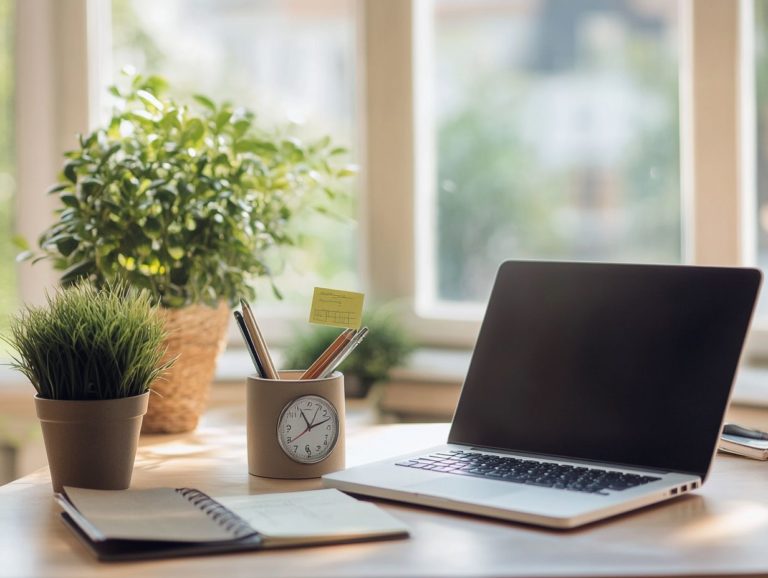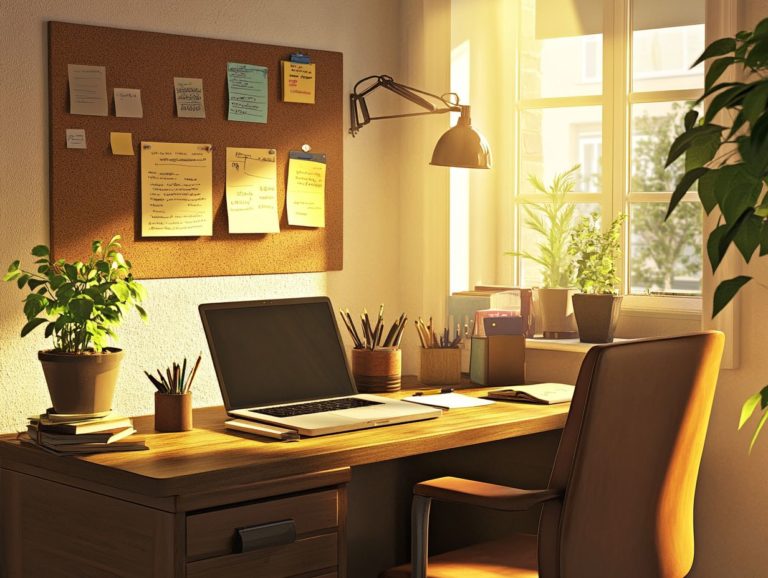The Benefits of Short Breaks for Productivity
In today s fast-paced work environment, you might find the notion of taking breaks to be counterintuitive. However, research reveals that stepping away from your tasks can profoundly enhance both your productivity and creativity.
This article delves into the vital role that short breaks play in maintaining focus and alleviating stress. It discusses various types of breaks, their benefits, and provides practical tips for seamlessly integrating them into your workday.
It also shows how a break-friendly culture can create happier and more efficient teams. A simple pause can change your work experience for the better!
Contents
Key Takeaways:
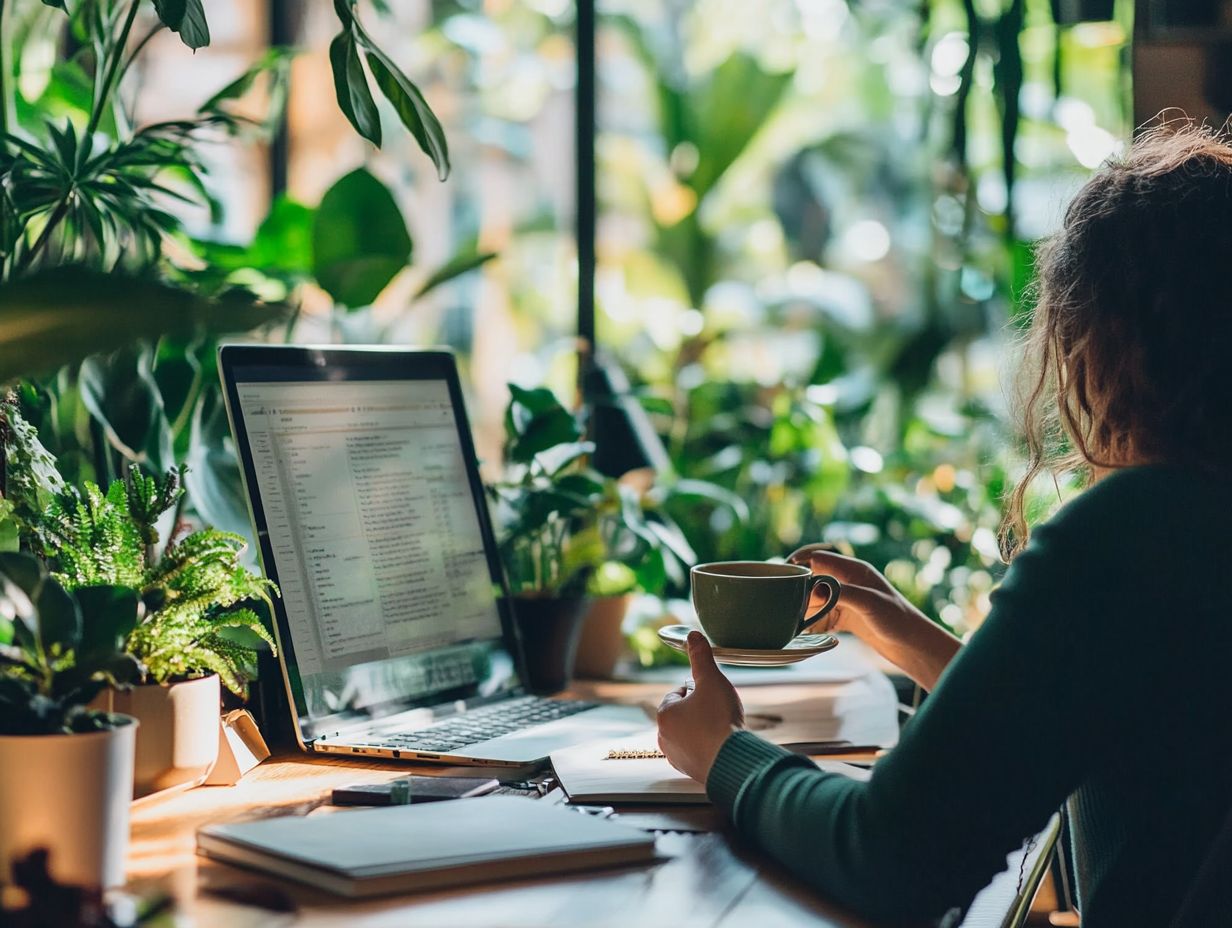
- Regular breaks boost productivity by letting your mind recharge.
- Short breaks help reduce stress and prevent burnout, creating a happier workplace.
- Employers should foster a break-friendly culture to enhance overall well-being.
The Importance of Taking Breaks
Taking breaks in the workplace isn’t just a luxury; it’s an essential aspect of sustaining productivity and nurturing overall well-being. Studies indicate that taking regular short breaks can greatly enhance your decision-making abilities and lighten your mental effort.
This allows you to recharge your mind and elevate your overall job satisfaction. In a fast-paced environment where stress often looms large, embracing strategic breaks can foster greater engagement, boost your well-being, and help you achieve a harmonious work-life balance.
The Effects of Continuous Work on Productivity
Continuous work without breaks can lead you down a path of increased fatigue, decision-making overload, and ultimately, a decline in productivity. It becomes increasingly difficult to maintain focus and creative output in such an environment.
This relentless cycle doesn t just hinder your brain function; it also takes a toll on your emotional well-being. Over time, the constant exposure to stressors can lead to burnout, manifesting as feelings of exhaustion and detachment. When you re unable to recharge mentally and physically your ability to innovate and approach tasks with clarity diminishes significantly.
The accumulation of stress can impair your problem-solving skills and sap your motivation, making matters even worse. Therefore, it s essential to recognize the importance of regular breaks and mental downtime to sustain both your well-being and performance in the workplace.
Types of Short Breaks
Grasping the different types of short breaks is crucial for optimizing their effectiveness. You can categorize breaks into active and passive types, each providing unique advantages for rejuvenating your mind and sharpening your focus.
Active vs. Passive Breaks
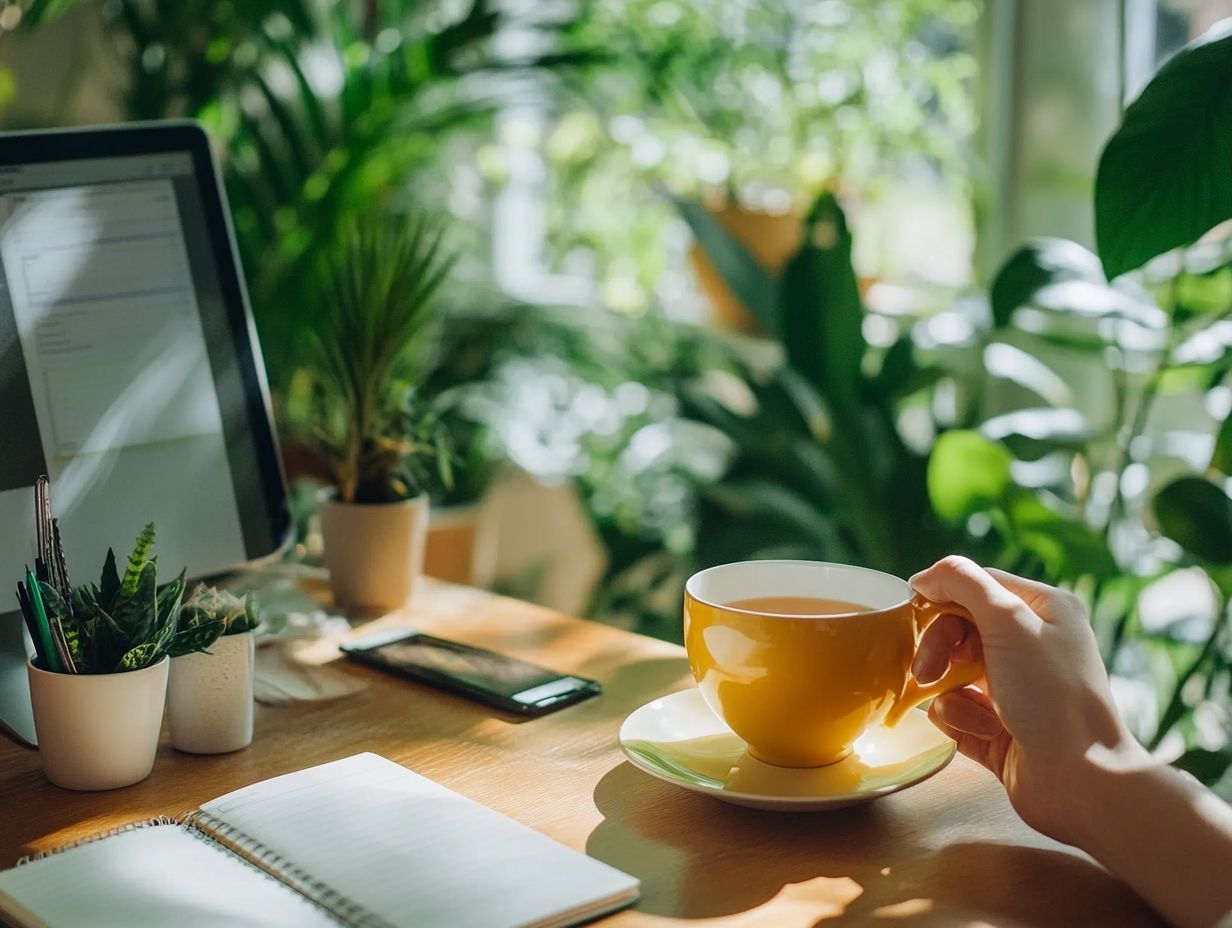
Active breaks mean doing something physical or creative, while passive breaks are about relaxing and letting your mind rest. Consider taking an active break with a quick stroll around the office, some stretching, or even a brief dance session. These activities can invigorate you and significantly boost your overall productivity.
On the other hand, passive breaks might include deep breathing exercises or listening to soothing music, allowing your mind to reset without any physical exertion.
The benefits of active breaks are plentiful; they enhance circulation and cognitive function, making tasks feel far less daunting. Meanwhile, passive breaks effectively reduce stress and anxiety, creating a sense of calm that can improve your focus when you return to work.
Understanding these distinctions enables you to optimize your work routine, enhancing both your mental health and efficiency.
Start implementing breaks today and experience the incredible benefits for your productivity and mental health!
The Benefits of Short Breaks
Short breaks offer a wealth of advantages, including heightened focus, a surge in creativity, and notable reductions in stress and burnout. Understanding the role of breaks in productivity can enhance your mental health and overall performance in tasks.
Embrace them as essential tools in your productivity arsenal.
Improved Focus and Creativity
Taking regular short breaks can significantly enhance your focus and ignite your creativity. When you step away from your tasks, you return with a refreshed perspective that can transform your work.
Research indicates that continuous work often leads to mental overload, hampering your brain’s ability to process information effectively. A study in the Journal of Occupational Health Psychology showed that brief intervals of downtime like stepping outside for fresh air or indulging in light stretching helped participants regain focus and boosted their productivity levels.
These breaks allow your mind to wander, essential for fostering innovative solutions to complex problems. By incorporating these pauses into your routine, you rejuvenate your mental energy and cultivate a work environment that embraces effective strategies for managing cognitive load.
Reduced Stress and Burnout
Don t overlook short breaks they are your best ally against stress! They help reduce stress and prevent burnout, improving mental health and creating a harmonious workplace environment.
When you step away from your desk, even for a few minutes, you recharge your mental faculties while nurturing a renewed sense of focus that boosts productivity. Employees who take regular intervals of rest report lower anxiety levels and greater job satisfaction. Many professionals share how a brief walk or a simple mindfulness exercise during a hectic workday helped them return with clarity and motivation.
This practice preserves your well-being and nurtures a supportive culture that values health and balance. It reduces turnover rates and boosts overall efficiency, creating a win-win situation for everyone involved.
How to Incorporate Short Breaks into Your Workday
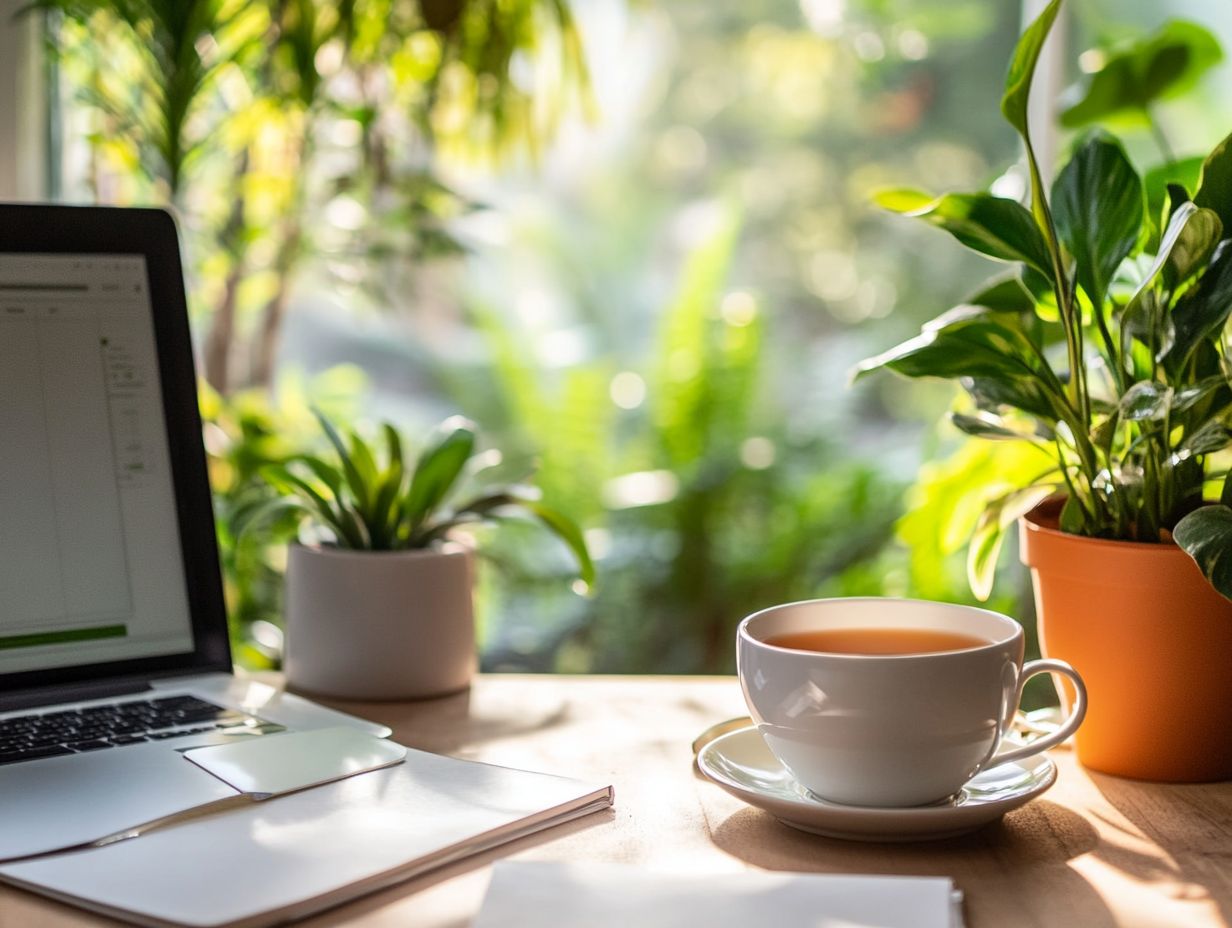
Use simple strategies to make breaks part of your workday. Incorporating short breaks is essential for sustaining productivity and well-being.
Tips for Effective Breaks
To truly maximize your breaks, implement strategies like adjusting break durations, practicing mindfulness, and self-monitoring.
Research shows that varying the length of your breaks taking short 5-minute pauses after 25 minutes of focused work, followed by longer 15-minute breaks every couple of hours can significantly boost productivity and concentration.
Mindfulness during these intervals can enhance your mental clarity and resilience. Light stretching, deep breathing, or a brisk walk outside helps reset your mind and body.
Self-monitor your energy levels to identify when a break is necessary, promoting a healthier and more balanced work routine.
Creating a Break-Friendly Work Culture
Cultivating a break-friendly work culture is crucial for elevating employee engagement and overall well-being. Encourage individuals to take time for nourishment and effective socialization during work hours to foster an environment where productivity flourishes and morale soars.
How often do you take breaks during your workday? Start incorporating breaks today for a more productive work life!
Encouraging Employees to Take Breaks
Encouraging breaks is vital for workplace morale and mental health. It boosts productivity and engagement.
Organizations can adopt strategies like regular mindfulness sessions or flexible break times. These allow everyone to recharge.
Some companies successfully use walking meetings. They promote physical activity, spark creativity, and foster teamwork.
Others have wellness programs that offer yoga classes or meditation rooms. These are great for reducing stress.
Establishing a culture that promotes relaxation can elevate employee satisfaction and create a supportive work environment.
Frequently Asked Questions

What are the benefits of taking short breaks?
Short breaks improve focus, reduce stress, and boost productivity!
How often should I take short breaks during work?
It’s recommended to take a short break every 60-90 minutes for optimal productivity. However, this may vary based on individual needs and job demands.
What activities should I do during my short breaks?
Choose activities that help you relax, like taking a walk, doing some stretches, or listening to music.
Can short breaks disrupt my workflow?
No, short breaks actually enhance workflow by preventing burnout and improving productivity. In fact, the benefits of taking regular breaks at work help your brain to rest and recharge, leading to better focus.
How long should my short breaks be?
Short breaks should ideally last around 5-15 minutes. This gives enough time for relaxation without disrupting your workflow.
What if my job doesn’t allow for frequent short breaks?
If your job doesn t allow for short breaks, advocate for your well-being. Speak with your supervisor about the benefits and find ways to incorporate them into your schedule.
Quick Tips: Take a walk, stretch, or grab a healthy snack during breaks!



